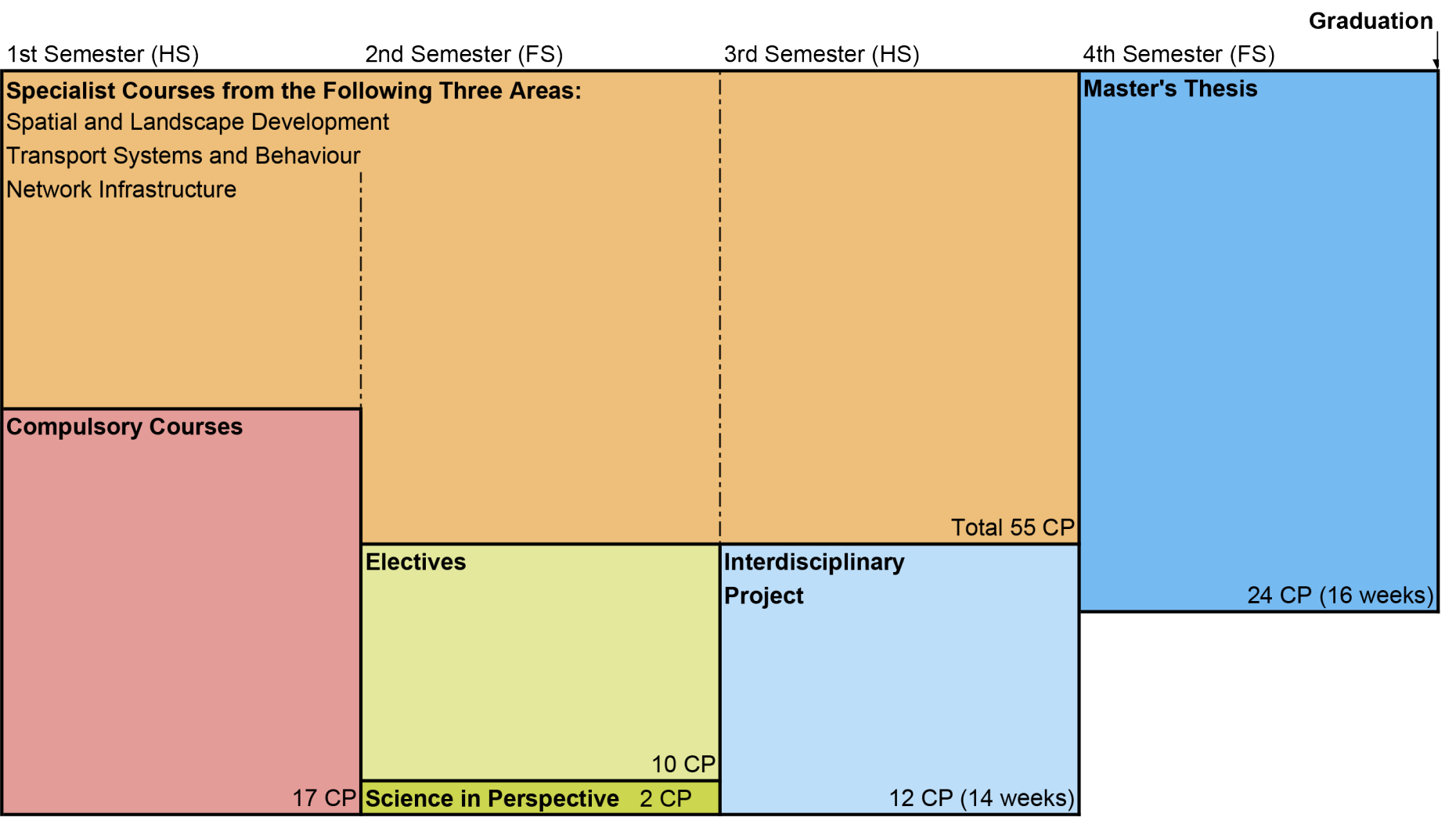Curriculum
The Master's degree studies include compulsory subjects, specialist subjects and electives. There is also project work in the form of interdisciplinary group work, and of course the Master's thesis, which leads to conferral of the degree.
Distribution of these subject groups over the four semesters is as follows and applies to all students commencing their Master's studies in the autumn semester 2018 or later:
Subject categories
A minimum number of credits for the Master's degree are required in each subject group. Detailed information on subject content, performance assessments, etc. in individual subjects can be found in the course catalogue.
The compulsory subjects are mandatory for all students on the Master’s programme. They convey basic knowledge in transport systems, environmental and landscape planning, spatial development, and infrastructure management, and include the following five lectures worth 17 credits:
- Transport Systems (6 credits)
- Introduction to Spatial Development and Tranformation (3 credits)
- Landscape Planning and Environmental Systems (3 credits)
- Basics of RE&IS (2 credits)
- Network Infrastructure 1 (3 credits)
Should one of the five compulsory subjects already have been completed at ETH Zurich during a preceding (Bachelor's) programme, the director of studies, in consultation with the tutor responsible, may approve a different course as a compulsory subject, on request. A reduction in the minimum number of credits required in the compulsory subjects is not possible.
The specialist subjects expand on and deepen knowledge in the three areas of Spatial and Landscape Development, Transport Systems and Behaviour, and Network Infrastructure. The subjects to be attended will be put together with the tutor from a pool of specialist subjects.
Students acquire at least 55 credits in the category of specialist subjects. The subjects can be freely selected from a range of specialist subjects.
The electives serve to broaden specialist knowledge and the acquisition of in-depth knowledge in selected areas of expertise. The entire curriculum of ETH Zurich and the University of Zurich is open to the students for individual selection.
Subjects are listed in a positive list, recommended for the degree programme. The list is available in the course catalogue under "Electives" subheading "Positive list for the programme of studies".
At least 10 credits must be acquired from the electives section.
The study programme Science in Perspective is taught by the professorships of D-GESS in history, conflict research, literature and cultural studies, economics, development and co-operation, philosophy, political science, psychology, law, sociology and scientific research. In addition, courses are offered in cooperation with the Language Centre of the University and ETH Zurich. Students wishing to do a language course need to enrol both at the Language Centre and at ETH Zurich to ensure that their registration is valid.
All "Science in Perspective" courses can be found in the ETH Zurich course catalogue under section "GESS Science in Perspective".
The acquisition of ECTS credits in "Science in Perspective" is mandatory for all ETH Zurich students. In the Master's degree programme in Spatial Development and Infrastructure Systems, at least 2 credits must be gained in this category.
For the acquisition of the Master’s title, evidence must be furnished of at least 120 credits in the corresponding categories. With this evidence, students can apply for the Master’s degree within four years from the start of the Master's degree studies.
Per category, the following minimum requirements must be met:
For the Master's degree, a maximum of 130 credits will be recognised in the final academic record. The final grade is calculated as the weighted average of all grades listed with the corresponding credit points as weightings.
All additional study achievements not required for the degree are listed on a separate page of the final academic record. Please note that all study achievements completed at ETH Zurich are listed, including any failed modules (only the second attempt will be listed in the case of repetition), any “no shows” (in the case of dropping out or failing to appear for a registered examination) and all additional admission requirements. In case a learning unit is successfully resat, only the performance achieved in the last attempt is listed.

